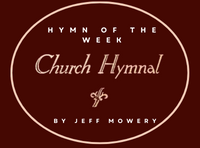More Love to Thee
More love to thee, O Christ, more love to thee!
Hear thou the prayer I make on bended knee.
This is my earnest plea: More love, O Christ, to thee;
more love to thee, more love to thee!
Once earthly joy I craved, sought peace and rest;
now thee alone I seek, give what is best.
This all my prayer shall be: More love, O Christ, to thee;
more love to thee, more love to thee!
Let sorrow do its work, send grief and pain;
sweet are thy messengers, sweet their refrain,
when they can sing with me: More love, O Christ, to thee;
more love to thee, more love to thee!
Then shall my latest breath whisper thy praise;
this be the parting cry my heart shall raise;
this still its prayer shall be: More love, O Christ, to thee;
more love to thee, more love to thee!
This hymn is probably as unfamiliar to you as it was to me. I don’t recall singing it growing up in Church (even though we probably did), but heard it recently on a Hymn’s CD that I have. The song is the author’s personal request for a closer, deeper relationship with God – i.e. “More Love to Thee.”
There are a couple of parts of the hymn that I wanted to comment on, and then I will share with you the story behind the author. In Verse 2, the author talks about the things her heart used to desire – “earthly joy” and “peace and rest.” Now she has reached a point in her life that her only desire is Christ because He is “what is best.” Jesus talked about this when He said in Matthew 6:33 – “But seek ye first the Kingdom of God and His righteousness, and all these things shall be added unto you.” We tend to seek after things in life, and most of these time the things we seek after are not wrong in and of themselves – peace, rest, contentment, comfort, fulfillment, etc. All of these things can be blessings in our life that come directly from the Lord. However, I think the author is trying to communicate that if we seek after God first, those things will come. If we are following Him and doing His will, the blessings of “peace and rest” will be a by-product of that. If, however, we pursue peace and rest first, these things will never truly come, because we are pursuing them instead of searching for a closer relationship to God.
The third verse of this song has a difficult statement in it, but I wanted to comment on it. I also would encourage you to “chew on it” a little bit, especially after you read the circumstances behind when it was written. The author is praying that the sorrow she feels will “do its work” (whatever work that might be), and then she is praying “send grief and pain.” I don’t know about you, but those words bothered me when I first read them. Why would someone purposefully pray for “grief and pain” in their life? The world has plenty of that already. I was reminded, however, of what Paul said in Romans 5 – “but we also rejoice in our sufferings, because we know that suffering produces perseverance; perseverance, character; and character, hope.” Did the author of this hymn have the right perspective in her prayer? I think her perspective was “Lord, if sufferings make me a better person, draw me closer to you, and produce more love in me for you, then I am okay with a prayer for grief and pain.” I will be the first to admit that I am not there yet. I tend to pray for the opposite of “grief and pain.” Those tend to show up without any encouragement from me. I also think about my children. Do I pray that they encounter hard times so that their character might be built up? To be honest, I don’t. My practice is to make their life easier in a lot of ways, not more difficult. This verse probably brings up more questions than answers in my mind, and probably in yours too. But if it makes us think a little bit about the words, I think that is a good thing.
Now to the background behind the author and this song. “More Love to Thee” was written by Elizabeth Prentiss during a time of great personal sorrow, following the loss of two children in a short period of time. For weeks Elizabeth was inconsolable. In her diary she wrote, “empty hands, a worn-out, exhausted body, and unutterable longing to flee from a world that has so many sharp experiences.” During this period of grief, Mrs. Prentiss began meditating upon the story of Jacob in the Old Testament. She noted how God met him in a very special way during his moments of sorrow and need. Elizabeth prayed earnestly that she too might have a similar experience. While she was meditating and praying one evening, the four verses of “More Love to Thee” were written.
I hope this hymn makes you think a little bit like it has me. My prayer is not that the Lord would “send grief and pain” to you. I haven’t prayed that for myself yet, so I won’t pray that for you. But I do pray that you will have a stronger, deeper love for Him. I hope we can all grow closer to Him without having to experience the same tragedies Mrs. Prentiss had to go through.

